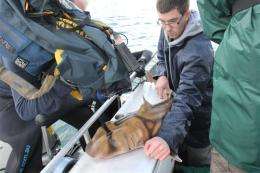Not just lone sharks: Social networks under the sea

(�鶹��Ժ) -- Scientists are delving into the social networking behaviour of sharks, to determine why and when large marine predators congregate, and the mysteries of their society.
Lead researcher Nathan Bass is conducting the study as part of his Honours project, in conjunction with Taronga Zoo.
“We hope that this research will help unlock some of the secrets of shark society”, he says. “In this day and age where the mere mention of the word ‘shark’ evokes a whole range of preconceived ideas, it’s humbling to acknowledge that much of the underwater world is still a mystery,” said Mr. Bass.
Despite various anecdotal recordings, little scientific research has been conducted on shark social behavior.
This project, focussed on Port Jackson sharks, involves researchers scuba diving to identify which sharks are interacting, tagging and fitting individuals with acoustic receivers to record and track the animals’ interactions and movements, conducting underwater surveys and setting up Acoustic Listening Stations in the Jervis Bay Marine Park to monitor shark and habitat use.
“Port Jackson sharks have some really interesting interactions,” says Bass. “These types of sharks can be solitary, but they often occur in large groups around breeding time. They are apparently social while resting and seem to favour their resting sites, frequently with more than 30 individual sharks recorded together in one area alone.”
Taronga Zoo researcher, Dr. Jo Wiszniewski, said: “Most people think that sharks are solitary species. Many shark species have shown us that their social networks are much more complex, and that they’re not just solitary animals.”
“Hammerhead sharks, for instance commonly school, great white sharks are normally solitary but have occasionally been spotted in pairs, and females of some shark species are often seen congregating together,” said Wiszniewski.
“What we’d like to find out is whether Port Jackson sharks are frequently congregating with the same individuals for social reasons, and if they are, whether they prefer to socialise with individuals of the same sex and size or rather with individuals they’re related to,” said Bass.
Learn more about the study in this video from Taronga Zoo:
Provided by Macquarie University

















